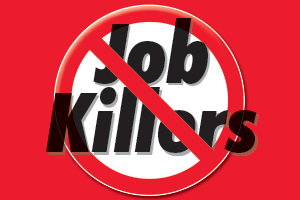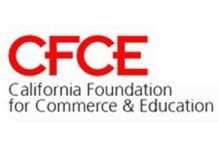 A job killer bill that will overwhelmingly impact small employers and will impose higher costs and additional administrative burdens passed a key legislative hurdle last week and has progressed to the Assembly.
A job killer bill that will overwhelmingly impact small employers and will impose higher costs and additional administrative burdens passed a key legislative hurdle last week and has progressed to the Assembly.
SB 1383 (Jackson; D-Santa Barbara) significantly burdens small employers by requiring employers with only five employees to provide eligible employees with 12 weeks of mandatory family leave, which can be taken in increments of one to two hours, and threatens these small employers with costly litigation if they make any mistake in implementing this leave.
Threat of Litigation Against Small Employers
The 12 weeks of leave mandated under SB 1383 is enforced through a private right of action that includes compensatory damages, injunctive relief, declaratory relief, punitive damages, and attorney’s fees. This provision would particularly hit small businesses who do not have a dedicated human resources team or in-house counsel to advise them on how to properly administer this leave.
The leave is not just as easy as giving an employee 12 weeks off and returning them to a workforce. The leave can be taken in small increments of one to two hours, placing a huge administrative burden on small employers to track the leave and then provide coverage while the employee is out. Any employee who believes an employer did not properly administer the leave, interfered with the leave, or denied the leave, can file for litigation.
A 2015 study by insurance provider Hiscox regarding the cost of employee lawsuits under the Fair Employment and Housing Act (FEHA) estimated that the cost for a small to mid-size employer to defend and settle a single plaintiff discrimination claim was approximately $125,000. Small employers cannot afford this additional cost.
Other Leaves Already in Place
This 12-week leave of absence on small employers cannot be viewed in isolation, but must be considered with regard to all of the other California-specific leaves employers must juggle, including the following:
- Pregnancy Disability Leave (up to four months);
- Disability leave under the FEHA (no specific amount of time – but not unlimited either. The leave provided must be considered as a “reasonable” accommodation for the disability);
- Workers’ compensation injury (amount of leave based upon doctor’s recommendation);
- California Paid Sick Leave (minimum of 3 days);
- Paid Leave for Organ/Bone Marrow Donation Leave (30 days/year);
- Jury Duty Leave (unlimited);
- Victim of Crime or Witness Leave (unlimited);
- Victim of Domestic Violence/Sexual Assault (unlimited);
- Emergency Duty of volunteer firefighters, reserve peace officers, or emergency rescue personnel (unlimited);
- Civil Air Patrol Leave (10 days/year);
- School Suspension Leave (unlimited); and
- School Activities Leave (40 hours/year).
Larger Employers Also Affected
California Family Rights Act (CFRA) and federal Family and Medical Leave Act (FMLA) leave normally run together, so the total time taken is a maximum of three months. SB 1383, however, greatly expands the definition of “family member” to include a child of a domestic partner, grandparent, grandchild, sibling, or domestic partner. Additionally, the bill removes the requirement that a “child” be under the age of 18 or a dependent adult child. Because a domestic partner, a child of a domestic partner, a grandparent, a grandchild, or a sibling are not family members covered under FMLA, these leaves will not coincide.
Accordingly, an employee can take leave under SB 1383 for three months to care for a domestic partner, child of a domestic partner, grandparent, grandchild, or sibling, return to work, and then take another three months off under FMLA for the employee’s own medical condition or the medical condition of a spouse, child or parent or for the birth, adoption or foster care placement of a child.
3 months – CFRA leave for a domestic partner, child of a domestic partner, grandparent, grandchild, or sibling;
PLUS (+)
3 months – FMLA leave for his or her own medical condition or the medical condition of his or her spouse, child or parent, or for the birth, adoption or foster care placement of a child.
Thus, SB 1383 creates six months of job-protected leave for larger employers covered by FMLA.
Vote
SB 1383 passed the Senate on July 2, 21-12.
Ayes: Allen (D-Santa Monica), Archuleta (D-Pico Rivera), Atkins (D-San Diego), Beall (D-San Jose), Durazo (D-Los Angeles), Lena Gonzalez (D-Long Beach), Hertzberg (D-Van Nuys), Hill (D-San Mateo), Hueso (D-San Diego), Jackson (D-Santa Barbara), Leyva (D-Chino), McGuire (D-Healdsburg), Mitchell (D-Los Angeles), Monning (D-Carmel), Pan (D-Sacramento), Portantino (D-La Cañada Flintridge), Susan Rubio (D-Baldwin Park), Skinner (D-Berkeley), Stern (D-Canoga Park), Wieckowski (D-Fremont), Wiener (D-San Francisco).
Noes: Borgeas (R-Fresno), Caballero (D-Salinas), Chang (R-Diamond Bar), Brian Dahle (R-Bieber), Dodd (D-Napa), Glazer (D-Contra Costa), Grove (R-Bakersfield), Hurtado (D-Sanger), Jones (R-Santee), Melendez (R-Lake Elsinore), Moorlach (R-Costa Mesa), Nielsen (R-Tehama).
Not Voting: Bates (R-Laguna Niguel), Bradford (D-Gardena), Galgiani (D-Stockton), Morrell (R-Rancho Cucamonga), Roth (D-Riverside), Umberg (D-Santa Ana), Wilk (R-Santa Clarita).
Staff Contact: Jennifer Barrera


